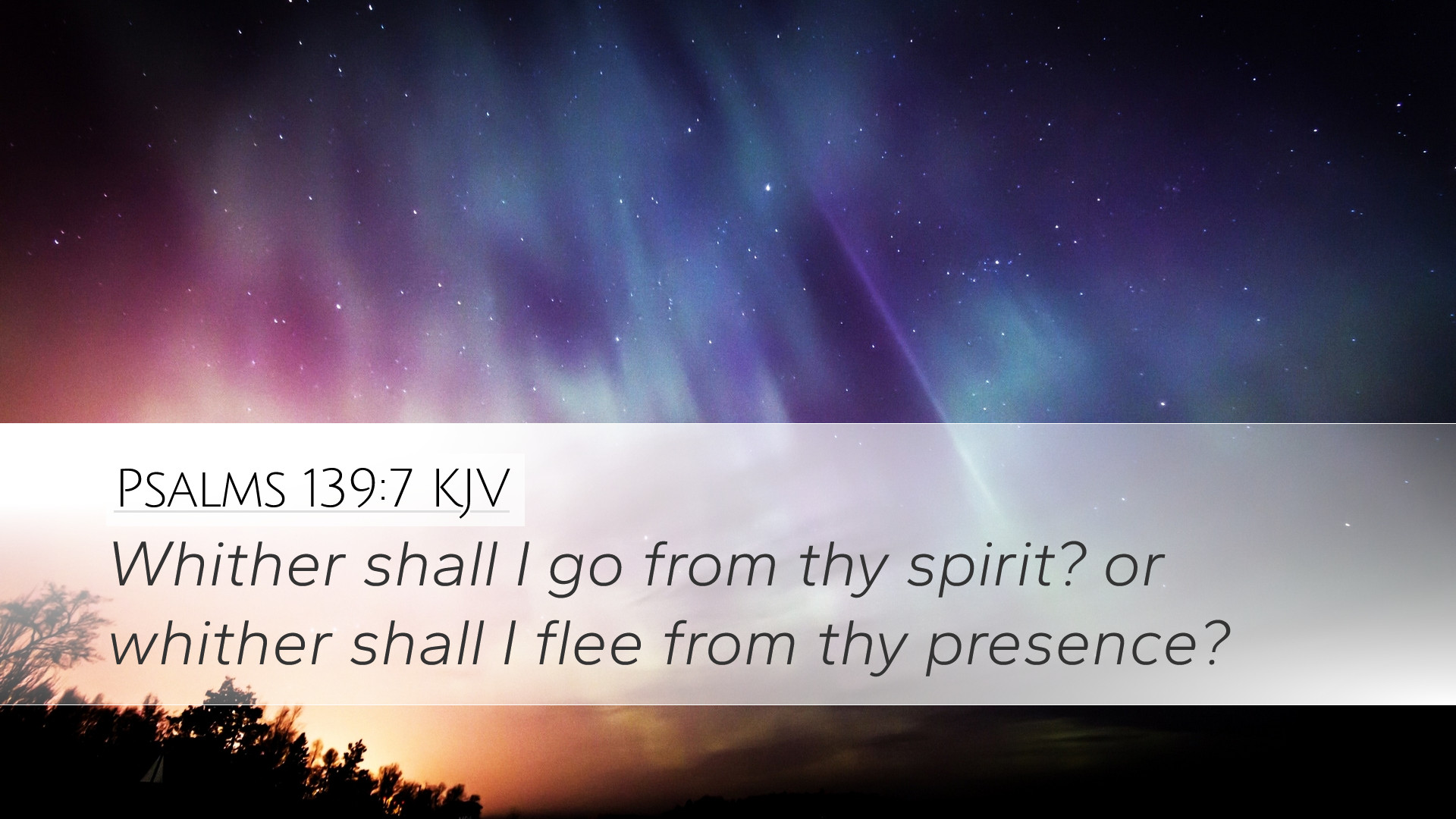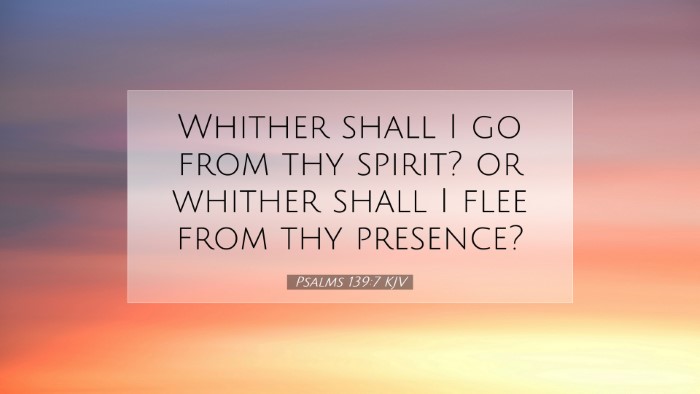Commentary on Psalms 139:7
Verse: "Whither shall I go from thy Spirit? or whither shall I flee from thy presence?"
Introduction
Psalms 139 is a profound meditation on the omnipresence and omniscience of God. In verse 7, the psalmist articulates a deep inquiry into the inescapable nature of God's presence. This verse challenges the reader to contemplate the intimacy of God's knowledge and the futility of attempting to flee from the divine.
Contextual Analysis
The psalmist, traditionally attributed to David, reflects on the nature of human existence in relation to the Creator. This verse is part of a larger discourse where David revels in the depth of God’s understanding and presence in our lives.
Divine Omnipresence
As Matthew Henry notes, this verse highlights God's omnipresence, emphasizing that one cannot escape from the Spirit of the Lord. God's Spirit penetrates every corner of creation, and there is nowhere the soul can hide from His awareness and influence.
Human Attempt at Evasion
Albert Barnes elaborates on the futility of attempting to flee from God. He remarks on human inclinations to seek refuge from divine scrutiny, which often stems from guilt or shame. The psalmist questions where one might go to escape God's watchful presence, demonstrating the innate human recognition of God’s sovereignty.
Philosophical Considerations
Adam Clarke suggests that this inquiry leads to profound philosophical reflection on the nature of existence and consciousness. The psalm invites scholars and theologians to explore the implications of divine omnipresence in the moral and ethical dimensions of life.
Theological Implications
This verse compels believers to consider the depth of their relationship with God. It poses significant theological questions about accountability, moral behavior, and the assurance of God's consistent presence. The acknowledgment that one cannot escape God—neither in the heights of heaven nor in the depths of the earth—serves both as a comfort and a challenge.
Comfort in God's Proximity
For the faithful, recognizing that God is ever-present brings solace and reassurance. The omnipresence of God is a reminder that in times of distress or loneliness, believers are never truly alone. Matthew Henry emphasizes this comforting aspect, suggesting that God's presence offers peace amid turbulent circumstances.
The Challenge of Accountability
Conversely, the awareness of God’s presence should evoke a sense of responsibility. Albert Barnes points out that this truth can prompt reflection on one’s actions and life choices. The conscious realization that God sees all should lead to greater integrity and sincerity in people’s lives.
Historical Interpretations
Throughout history, theologians and scholars have wrestled with the applications of this verse. Early Church Fathers and Reformers alike used Psalm 139 to underscore the immutability of God and the constant need for human beings to submit to His will.
Patristic Perspectives
In the writings of the Church Fathers, there is an emphasis on the transformative power of realizing God’s omnipresence. They encourage believers to find strength and encouragement in the knowledge that they are always in God's sight.
Reformation Insights
The Reformers, including Martin Luther, often referenced Psalm 139 in discussions about grace and the transformative work of the Spirit. They argued that understanding God's omnipresence should lead to lives marked by gratitude and worship.
Application for Modern Believers
For contemporary Christians, this verse encourages a deeper reflection on one’s faith journey. It calls for an engagement with the notion that God is intimately aware of every aspect of our lives.
In Personal Reflection
Believers are invited to meditate on the implications of God’s pervasive presence in their lives. This could encourage practices such as prayer and meditation, fostering a personal relationship with God that acknowledges His nearness.
In Community Worship
In corporate worship settings, Psalm 139:7 serves as a powerful reminder of the unity believers share in the presence of God. This reality can reshape community dynamics, emphasizing accountability and togetherness under the watchful eye of the Creator.
Conclusion
Psalms 139:7 encapsulates a profound theological truth that resonates across time and space. It serves as both a reminder of God's intimate presence in our lives and a challenge to live authentically in the light of that presence. For pastors, students, theologians, and scholars, this verse invites ongoing exploration and reflection on the nature of God’s omnipresence and its implications for faith and practice.


